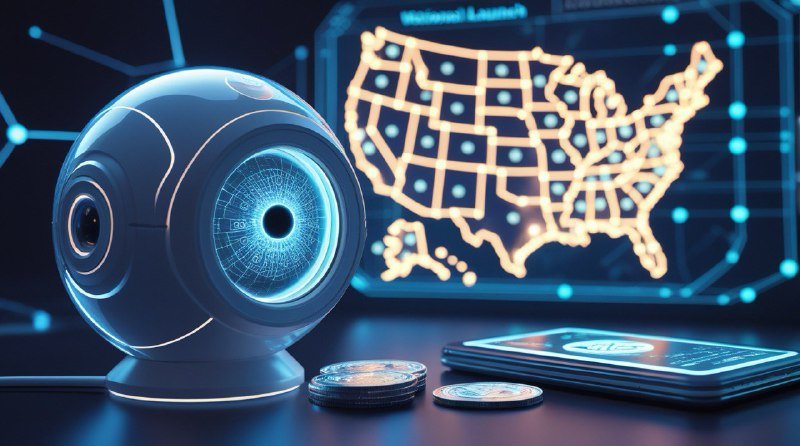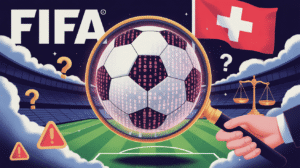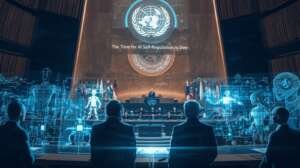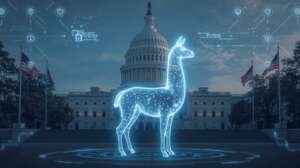Sam Altman, the CEO of OpenAI, has officially brought his ambitious digital identity project, now rebranded as World, to the United States. Previously known as Worldcoin, the project is designed to solve a pressing challenge in today’s AI-driven world: how do we prove that someone online is actually a real human?
With deepfakes, bots, and AI-generated content flooding the internet, verifying identity has become more important than ever. Altman’s solution? A global platform that uses biometric technology — specifically, an eye-scanning device called the Orb — to confirm that users are unique individuals.
What Is World?
World is a global identity project built around the idea of proving personhood in a world increasingly flooded with bots, deepfakes, and AI-generated content. The company offers a crypto token called Worldcoin (WLD), which users can receive by verifying their identity using a device called the Orb. This device scans a person’s face and eyes — specifically, their irises — to confirm they are indeed a real, unique human being.
Once scanned, the system generates something called a World ID. This ID is designed to be a secure, privacy-preserving proof of personhood that users can carry with them across platforms.
Now in the U.S.
As of April 30, World is officially live in six U.S. cities that the company calls “key innovation hubs”: Atlanta, Austin, Los Angeles, Miami, Nashville, and San Francisco. Orbs have been set up in each of these cities, including in select Razer retail stores, where people can line up, scan their eyes, and receive their World ID.
New users are being rewarded with 16 WLD tokens for signing up. Those who already registered get a “pioneer grant” of 150 WLD — an incentive that shows World is serious about user growth.
While the project has been live internationally for a while, it held off on launching in the U.S. until now due to regulatory uncertainty. But with the new Trump administration taking a friendlier stance on crypto, World seems more confident in entering the American market.
So… You Scan Your Eyes for Crypto?
Yes — and that’s raised a lot of eyebrows. The Orb is a shiny, spherical device that resembles something out of a sci-fi film. You stare into it, and it captures a high-resolution image of your iris. This is turned into a secure, anonymized code stored on the blockchain. From there, you receive your World ID and can start using the WLD token.
This ID isn’t just for collecting tokens. It’s meant to be a kind of passport for the internet. You can use it to prove you’re a real person on platforms like Reddit, Discord, Telegram, Shopify, and even Minecraft.
In an era where spam bots and AI-generated profiles are everywhere, this kind of verification could help clean up digital spaces. Imagine logging into your favorite platform and knowing with confidence that every other user has also proven they’re human.
Visa Enters the Chat
At a San Francisco event on April 30, World made another big announcement: it’s partnering with Visa to launch the World Visa Card.
This new card, expected later this year, will allow users to make purchases using WLD tokens and other cryptocurrencies. It’s a major step toward making crypto spendable in the real world, not just held in a wallet or traded on an exchange. You’ll be able to swipe this card at any location that accepts Visa, which is like just about everywhere.
On top of that, World is exploring stablecoin payments and even adding foreign exchange services to its World App, further blurring the lines between traditional finance and crypto.
Dating, Gaming, and More
But World isn’t stopping at payments and identity. It’s building an entire ecosystem.
One of the most intriguing applications? Online dating.
Match Group — the company behind Tinder, Hinge, Match.com, and Plenty of Fish — is piloting World ID integration into its apps. The idea is simple: verify that profiles belong to real people, not bots or scammers. That means fewer fake matches and a safer, more transparent dating experience.
World is also teaming up with gaming brand Razer. They’re launching what they call the League of Humans — a competitive gaming tournament where all participants must be verified by World ID. It’s a fun twist on esports and a practical demonstration of how digital ID verification can combat cheating and spam in gaming.
Additional partnerships include:
- Kalshi, a prediction market platform that can benefit from verified users for better market integrity.
- Morpho, a decentralized lending protocol looking to use World ID to enhance security and reduce sybil attacks.
A Global Vision — But Not Without Pushback
Altman and his team first launched the project back in 2019 under the name Worldcoin. The goal was (and still is) to create a global, decentralized identity system tied to the blockchain. In 2024, the project rebranded to World, and today it boasts over 26 million users worldwide. Of those, 12 million have completed Orb scans.
But the project hasn’t been smooth sailing everywhere.
World has faced serious scrutiny from privacy regulators around the globe. Several countries, including Spain and Portugal, have temporarily banned its operations due to concerns over how biometric data is collected and used. Others are still probing the project for possible violations of local data protection laws.
The team behind World insists the biometric data is stored securely and anonymized. They say it’s never sold or used to identify people personally. But concerns remain, especially in regions with strict privacy laws like the EU.
Even in the U.S., World isn’t launching in every state. For example, regulatory hurdles in New York have prevented a local rollout there for now.
Crypto Markets React — Briefly
Following the U.S. launch news, Worldcoin (WLD) saw a short-lived bump in price — jumping around 15% at one point. But those gains didn’t last. The token has since dropped over 5% in the past 24 hours and is currently trading just over $1, far below its all-time high of $11.74 set in March 2024.
That kind of volatility is nothing new in the crypto world. Still, it raises questions about the long-term value of the token, especially if regulatory or public trust issues continue to slow growth.
The Big Picture?
Sam Altman’s World is one of the most ambitious projects at the intersection of crypto, digital identity, and biometrics. It’s trying to solve a very real problem: how can we prove our humanity online as AI-generated content becomes more convincing?
World is pushing boundaries, whether scanning your eyes for crypto becomes a mainstream habit or not, it’s clear that the debate around digital identity is just getting started.
And with millions already onboard and more cities being added, World’s global rollout is worth watching — not just as a crypto experiment, but as a potential blueprint for the future of how we prove who we are online.




